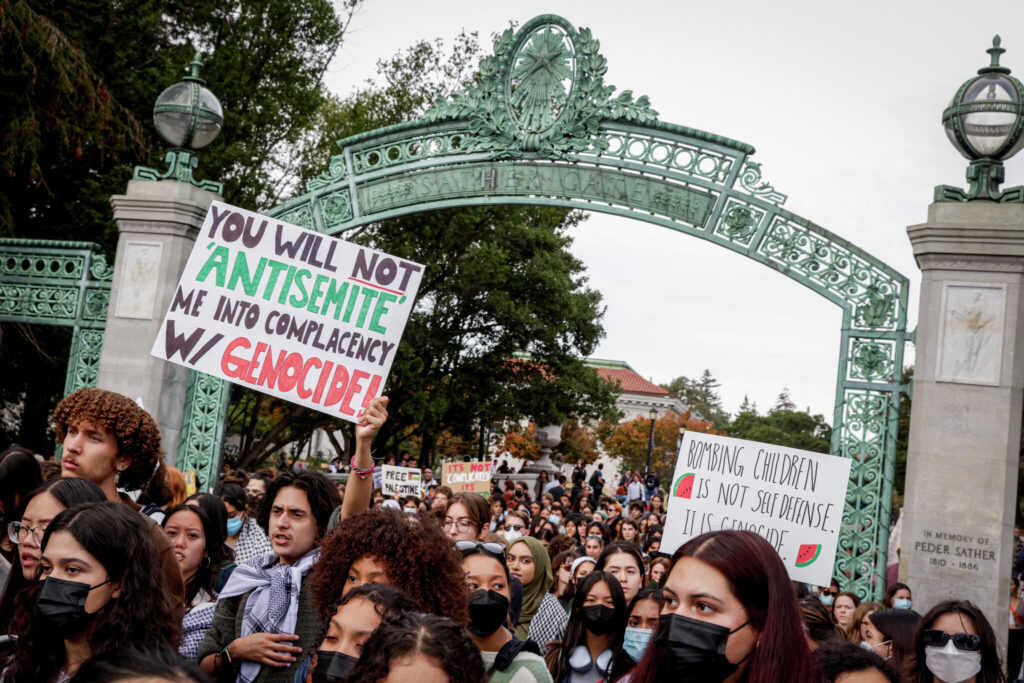
When I saw the police clash with protesters and ram a window to end the takeover of Hamilton Hall during the recent Gaza protests, I had an eerie flashback. It stoked memories of my graduate school days at Columbia, where I would frequently pass by that building on my way to classes across Amsterdam Avenue at the School of International and Policy Affairs. The center of the protests, the awesome expanse of grass in front of the Columbia library, was “one of the great urban spaces,” as a colleague of mine called it. A few years later it would be the scene of a huge protest against the war in Vietnam that was at least as large and confrontational as the one this year that focused on Israel’s war on Gaza.
By the time of the Columbia protests in the 1960s, however, I was a graduate student on a different campus, at Berkeley. I flashbacked to memories of protests that were even larger and more strident. I was convinced that the war was wrong-headed, having spent some months in Vietnam as a journalist and seeing the debacle at close hand. So I joined the protests with enthusiasm. Besides, it was Berkeley in the 60s. Along with pot and free love, it was the thing to do.
Four of my colleagues in sociology who were also active in the anti-Vietnam war protests many decades ago have posted an open letter comparing the current campus protests with our struggles in the 60s. They point out that student protests have often been the leading edge of public critique and the vanguard of social change. They show the resistance of establish authorities to moral retrospection and change. I agree with this, and compliment my colleagues, all of them Jewish, for their support for the rights of students to protest.
But there is one big difference between the current anti-war protests and those of the sixties. The protests today are so intimately personal.
In the 60s, few of us actually knew any Vietnamese. Our cause was not so much for the independence of Vietnam, but against the war itself. Few of those opposed to our protests wanted the American occupation of Vietnam to continue, or hated Vietnamese as people. They just didn’t like to see protests. And they trusted our government. We didn’t.
The situation today is vastly different. Appearing at the forefront of many of the campus protests are students of Middle East background, many of them Muslim and quite a few with connections to Palestine. Also in the campus melees are a huge number of Jewish students, many with ties to Israel, who have been on both sides of the protest movements.
One of these Jewish students recently contacted me, trying to add my course on global conflict to her schedule. She wanted to understand better what was going on, she said. Though she had family in Israel her sympathies were with all of those affected by killing and war, including the Palestinians. But she said she was afraid to wear her locket that displayed the Star of David without being chastised on campus as a supporter of Israeli genocide. She was afraid to be identified as being Jewish.
My Muslim students have voiced a similar fear. By simply supporting the rights of Palestinians and accusing Israel of over-reaching in its militant response to Gaza, they have been accused of being terrorists, and supporters of Hamas.
Both sides are shouting at each other. The rights of peaceful protest and public debate, and the critique of US involvement with the armaments of war have devolved into personal, tribal animosities.
My Jewish colleagues who have written the letter of support for the protesters point out that criticism of the policies of the state of Israel is not antisemitism. After all, we do not assume that Shi’a Muslims support Iran, even though it is a self-proclaimed Islamic state. Still, Israel’s Prime Minister Benjamin Netanyahu has encouraged this connection, insisting that Israeli and Jewish identity are intertwined and any critique of his regime is anti-Semitic by nature.
As a result, my Jewish students are living in a climate of fear, labeled by their mere religious identity as supporters of Israel’s military assault. Even Jewish students who have been involved in the anti-Gaza protests are themselves sometimes targeted by their fellow protesters.
In a sad way, what is happening on campus has mirrored the current political culture of the United States and much of the rest of the world. Confrontation has degenerated from the level of ideology and policy to the primal contest between tribal communities formed around race and religion.
A disturbing underside to the presidential election slated for later in 2024 is the competition between White Christian autocracy and multicultural democracy. Race and religion are at the heart of the political differences in many of the races leading up to the Fall elections.
At the level of race and religion, however, these contests cannot be won. They can only be overcome. In the 60s, when the Vietnam War finally ended, the protests dissolved. The war was over. The conflict was forgotten.
This year, if a permanent cease fire ends the killing in Gaza, and progress is made towards the civil rights of Palestinians, the campus protests will likely also end. But the bitterness that the protests have awakened may linger, possibly for some time to come. Alas the same is true about the wider differences of race and religion in our current political culture.
